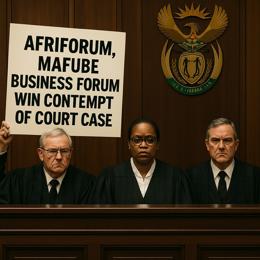Image created by AI
Constitutional Court Advances AfriForum's Case Against John Hlophe's JSC Appointment
In a significant legal development, AfriForum has moved closer to its objective of challenging former Western Cape judge president Dr. John Hlophe's recent appointment to the Judicial Service Commission (JSC). The Constitutional Court has issued a set of directives that compel the respondents in the case to present their answering affidavits, marking a pivotal point in the legal proceedings.
AfriForum, an advocacy group, has been steadfast in its assertions that Hlophe's appointment to the JSC was neither rational nor lawful and that it contravenes the constitutionally enshrined duties of the National Assembly. By granting AfriForum's request for direct access—a procedural move that expedites the handling of pressing constitutional matters—the Constitutional Court has signaled its openness to deliberate on the merits of the case.
Kallie Kriel, CEO of AfriForum, welcomed the Court's directives, viewing them as a positive portent for their campaign to overturn what they perceive as a detrimental blow to the integrity and independence of South Africa's judiciary. The case has ignited vigorous debate about the balance between judicial autonomy and accountability within the highest echelons of the nation's legal framework.
Respondents in the case, including the speaker of parliament, Dr. Hlophe, and the MK Party, are required to lodge their affidavits by Friday, a deadline that underscores the Constitutional Court’s intention to address the matter with due urgency.
This legal challenge follows on the heels of a recent dismissal by the Constitutional Court of Hlophe's own application for direct access, in which he sought to reverse the process that led to his removal as a judge. The court's firm rebuke in that instance only serves to underline the contentious nature of Hlophe's involvement in the JSC and raises questions about the judicial appointment and discipline processes in South Africa.
As AfriForum awaits the responses from the case's respondents, their hope remains that Hlophe's JSC appointment will be annulled by the Constitutional Court, thereby reinforcing the pillars of judicial credibility and addressing concerns over encroachments on the rule of law.
The outcome of this case is poised to have far-reaching implications for the constitutionally defined roles of the JSC and the equilibria within South Africa's legal institution. It holds the potential to redefine the parameters of acceptable conduct and appointment criteria for judges, a precedent-setting scenario that will be keenly observed by legal practitioners and constitutional scholars alike.










